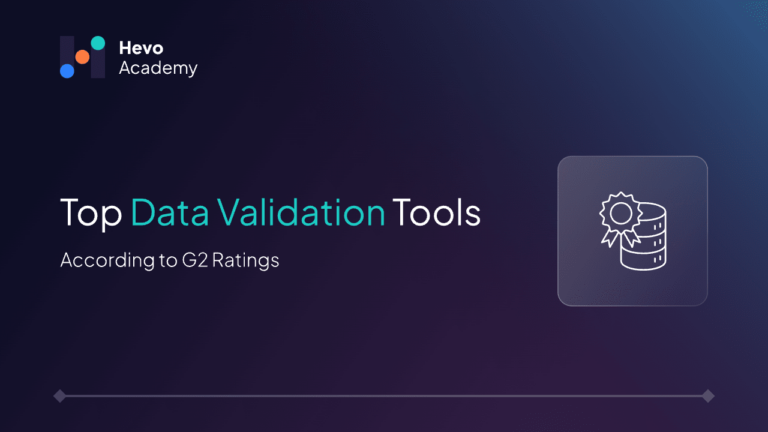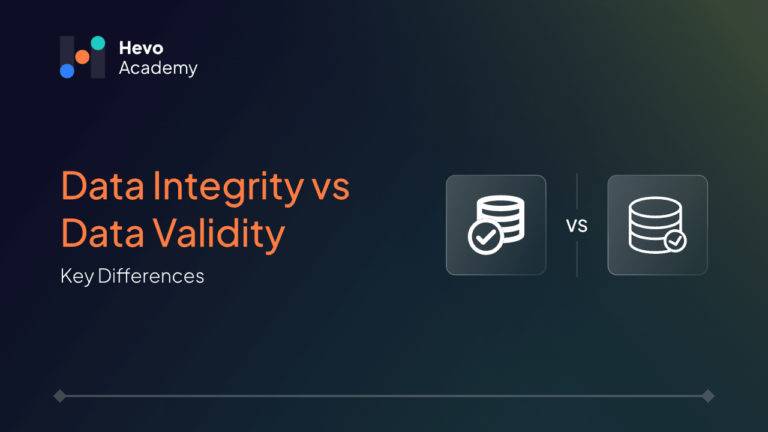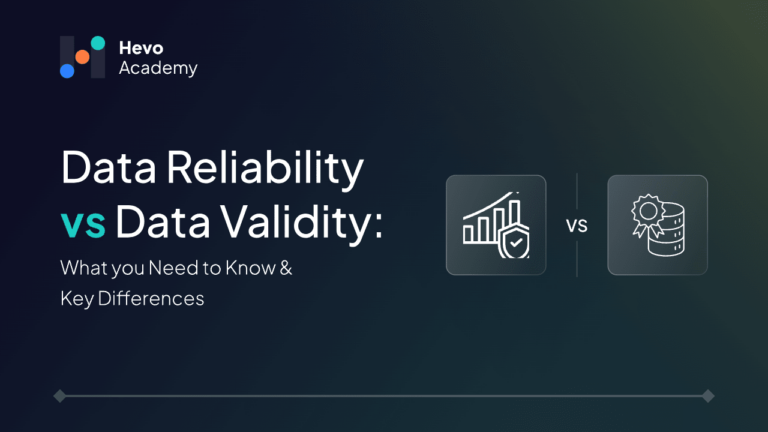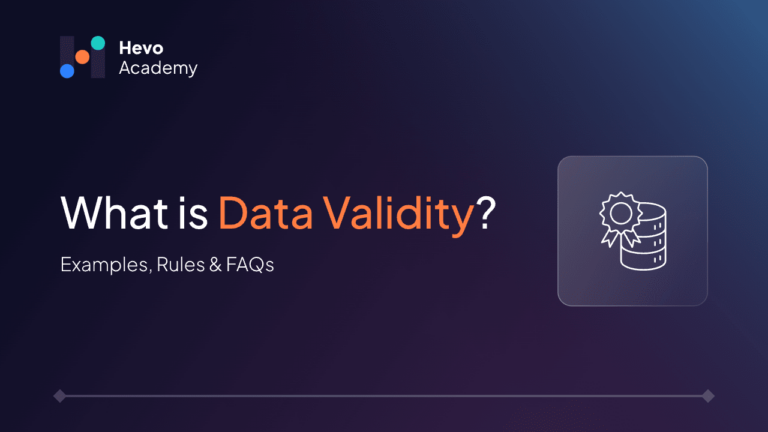Bad data can lead to poor decisions, inaccurate reports, and missed opportunities. That is where data validation comes into the picture to ensure that your data is right, consistent, and ready to use. Whether you’re managing customer data, running analytics, or making one of the critical business decisions, validated data is the foundation of any good strategy.
Table of Contents
But how do we make data validation efficient and foolproof? In this blog, let’s get into the importance of data validation and its benefits and discover data validation tools like Informatica, Talend, and Hevo that simplify the process. Read about the best practices as well to help you integrate robust validation into your workflows.
What is Data Validation?
- It validates the correctness, completeness, consistency, and adherence to certain criteria that the data is correct before storing, processing, or analyzing it.
- It highlights errors, inconsistencies, or anomalies to correct them to ensure the quality and dependability of the data.
- Validation can take place in any of these steps: during data entry, migration, or integration.
- Common techniques here would be checking on the type, formats, ranges, and business rules.
- Data validation verifies accuracy and cleansing errors in organizational decision-making adherence to rules, and, therefore, it is part of successful data management.
Compare data validity with data integrity to see how they determine the accuracy and reliability of data.
Benefits of Data Validation
- Data Quality and Accuracy: Data that is captured should be without errors, proper, and credible for further analysis and making decisions.
- Good Decisions: Justifies a sound platform of reliable data that will, therefore, result in the formulation of actionable insights.
- Reduces Errors and Costs: Expensive errors caused due to bad or insufficient data are reduced.
- Compliance: Helps in complying with regulation standards because of the checks of integrity and consistency of data.
- Processes: Correction of errors becomes a manual process that reduces, hence saving time and resources.
- Customer Confidence: Accuracy on data of customers means the right communication and great experiences.
Best Tools for Data Validation
1. Hevo Data
G2 Rating: 4.3/5
With real-time, automated data pipelines and no-code functionality that focuses on instant data validation and replication across 150+ integrations, Hevo provides ease of use and zero maintenance setup, making it a great option for teams who care more about speed and simplicity.
Pricing
- Free Trial Available: Hevo provides a 14-day free trial where users can experiment with its features before committing to a paid plan.
- Subscription-Based Pricing: Hevo Data provides tiered subscription plans, which vary by the volume of data, number of data sources, and number of features required.
- Transparent Pricing: Plans begin at $239 per month, while custom quotes are available for large enterprise needs or specific use cases.
Pros and Cons
| Pros | Cons |
| Real-time data handling. | Focused on real-time, cloud-based workflows over offline handling. |
| Easy-to-use, no-code platform. | 24/5 support means you can get assistance with the product at all times, making it very reliable. |
| Supports 150+ integrations. | There is a limited need for customization due to its extensive pre-built features such as drag-and-drop transformations. |
2. Informatica
G2 Rating: 4.4/5
Informatica is the most powerful enterprise data management software, providing critical data integration, validation, and governance capabilities. Informatica is designed to be an advanced feature with AI-powered data quality management, metadata-driven data lineage tracking, and scalable ETL processes.
Pricing
- Custom Pricing Model: Informatica doesn’t have fixed pricing—it offers customized quotes based on your business size, data volume, and specific requirements. Read more about the pricing of Informatica.
- Subscription-Based Plans: Most Informatica products, such as Informatica Cloud, are payable through a subscription-based model where one can pay monthly or yearly.
- Costly Higher Packages: Additional advanced features like AI-driven automated data validation or enterprise-class data governance are liable to expensive cost totals.
Pros and Cons
| Pros | Cons |
| Handles large-scale, complex data integration and management with ease. | Pricing can be expensive, especially for small and mid-sized businesses. |
| Connects to diverse data sources, including cloud, on-premise, and hybrid systems. | Requires skilled professionals for implementation and management. |
| It adopts AI for quality of data, lineage tracking as well as metadata management | Integration with non-native tools is hectic. |
3. Astera
G2 Rating: 4.4/5
Astera is a user-friendly tool for integrating and transforming data; it is primarily created to help businesses automate their data workflows. Astera has an intuitive drag-and-drop interface that has helped simplify complex data operations, making it an excellent choice for teams who are looking for something easy to use with data management without the need for code.
Pricing
- Free Trial: Astera provides a free trial so that users can experience the functionality of its system before committing to a paid plan.
- Subscription-Based Pricing: Pricing Fees are based on the feature set, number of users, and the volume of data needed.
- Custom Pricing: Quotes for large businesses or for specific business needs.
Pros and Cons
| Pros | Cons |
| Easy-to-use, drag-and-drop interface. | Limited scalability for very large data operations. |
| Excellent for small to mid-sized businesses. | Advanced features may require more technical expertise. |
| Robust data validation capabilities. | High initial setup cost for advanced configurations. |
4. Talend
G2 Rating: 4.2/5
Talend is an open-source flexible data integration tool that has powerful ETL (Extract, Transform, Load) capabilities. The solution delivers an intuitive user interface and a library of several connectors to help businesses manage their data workflows and integrate data between multiple systems. Talend is highly recommended for large-volume data enterprises that need to install both cloud and on-premise deployments.
Pricing
- Free Version: Talend is free and open source, but it offers only the basic features, with support available only for small-scale integrations.
- Subscription-based: Talend offers tiered subscription plans for cloud-based products, with costs varying according to features and data integration volumes.
- Custom Pricing: Talend offers enterprise-level plans with custom quotes for larger organizations with more complicated data integration needs.
Pros and Cons
| Pros | Cons |
| Flexible and open-source version available. | The free version has limited features and support. |
| Extensive library of 1000+ connectors for seamless integrations. | Some advanced features require premium plans. |
| Strong data quality and transformation capabilities. | It can be resource-intensive for smaller businesses. |
5. Datameer
G2 Rating: 4.2/5
Datameer is a next-generation data transformation platform that simplifies and accelerates analytics workflows. The collaborative, no-code environment allows for fast and effective preparation, integration, and transformation of data for business intelligence and analytics. It’s great for teams who want flexibility and ease of use without heavy technical overhead.
Pricing
- Per-User Pricing: Starting at $100 per user per month, scalable based on number of users and project size.
- Custom Enterprise Plans: Large enterprises with different needs, a pricing structure that goes by data volume, complexity, and integrations.
- Free Trial: A free trial can be accessed to test the features before buying.
Pros and Cons
| Pros | Cons |
| Integration with major BI tools such as Tableau, Looker, etc. | Pricing can become expensive for large teams. |
| Intuitive data transformation features. | It may not handle extremely complex workflows. |
| Cloud-native and scalable. | On-premise deployment is not an option. |
6. Alteryx
G2 Rating: 4.6/5
Alteryx makes data workflows simple with its intuitive drag-and-drop interface, allowing the creation of advanced analytics such as predictive modeling, machine learning, and spatial analysis. It supports straightforward data preparation, integrates from multiple sources, and offers cloud connectivity for both desktop and enterprise-scale environments.
Pricing
- Designer Desktop: Starting at $5,195 per user per year. Data preparation, analytics automation, and cloud connectivity are covered.
- Professional (Designer Cloud): $4,950/year per user; minimum of three licenses. Includes data orchestration, shared success manager, and unlimited manual workflows.
- Enterprise plan: The enterprise plan features custom pricing. It supports large deployments with role-based access and APIs.
Pros and Cons
| Pros | Cons |
| Intuitive, no-code design. | The transition from desktop to cloud can be challenging for some users. |
| Extensive analytics capabilities. | High pricing limits accessibility for smaller businesses. |
| Supports spatial and predictive analysis. | Limited AI business tools compared to competitors. |
7. Data Ladder
G2 Rating: 4.2/5
Data Ladder offers tools for data cleansing, deduplication, and matching that make it so suitable for maintaining high data quality. Solutions such as DataMatch Enterprise focus on intuitive, code-free workflows for different business sizes. The platform supports data profiling and multiple source integration with the aim of standardizing data correctly. Read about data profiling vs data quality to understand different purposes in data management.
Pricing
- Entry-Level Cost: The amount is not available online, but interested users are advised to request a customized quote from their pricing page for specific needs.
Pros and Cons
| Pros | Cons |
| Code-free, intuitive interface for data profiling and matching. | Primarily desktop-based. |
| Supports deduplication and data standardization across sources. | Pricing details are not transparent and require a quote request. |
| Ideal for businesses looking for accurate, high-quality data. | Lacks advanced AI-driven analytics capabilities. |
Best Practices for Data Validation
- Clear Definition of Rules: The definition of what is correct, complete, and consistent ensures a systematic validation process.
- Automate validation activities: Big data validation tools and scripts used for automation are prone to few human errors, which helps validate the big data lists effectively. Read about the risks of poor data quality to avoid low-quality data and take preventive measures.
- Validate at entry points: Employing checks on all the entry points helps minimize catches in error at downstream points of data entry and thus saves time.
- Conduct Periodic Data Audits: Schedule regular data quality checks to monitor ongoing inaccuracies and take appropriate corrective action right away.
- Multiple Types of Validation: Integrate rule-based, statistical, and AI-driven approaches into one sound validation strategy.
- Documentation of Exceptions and Log of Validation Errors: Record cases of validation errors and their resolutions on continuous process improvement and accountability.
Conclusion
Data validation is one way of ensuring that the information in an organization is maintained at a level of integrity and reliability. With strong validation processes in place, businesses can make much better decisions and minimize errors while increasing operational efficiency. The best tool should be identified as each has specific strengths: Talend is open-source and flexible, Alteryx brings advanced analytics, and Informatica offers enterprise-grade solutions.
Among those features, Hevo is highlighted due to real-time data handling with a no-code platform, making it the best choice for business users who want simplicity and speed in data validation. Hevo offers more than 150 (60+ free) integrations and automated workflows so the teams stay focused on insights rather than errors and deliver quality data each time.
Want to give Hevo a try? Sign Up for a 14-day free trial and experience the feature-rich Hevo suite firsthand.
FAQs
1. What are the four types of data validation?
The four types of data validation are Format validation, which checks the format of data; range validation, which checks for values to be within a range; consistency validation, which makes sure data in associated fields makes sense; and uniqueness validation, which prevents entries with duplicate data.
2. What is data validation in SQL?
SQL data validation relates to putting constraints like NOT NULL, CHECK, UNIQUE, or PRIMARY KEY on the data entered into a database to ensure such requirements are met in terms of integrity.
3. What are the 5 validation checks?
There are five validation checks: range checks, which are data value limits; format checks, ensuring correct data format; presence checks to ensure that required fields aren’t empty; uniqueness checks to avoid duplicate entries; and length checks, where the data should not exceed the character limits.





